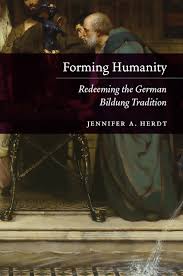Timothy Stoll at Notre Dame Philosophical Reviews:
 The German word Bildung is notoriously difficult to render in English. Its most common meaning is perhaps ‘education,’ though in a more capacious sense than what happens exclusively in schools and universities. It is related to the German for ‘image’ (Bild) and the verb meaning ‘to form, shape, construct’ (bilden), and so suggests, when applied to a human being, a kind of quasi-aesthetic formation of one’s character. The complexities and ambiguities of the term provide a considerable obstacle to those interested in late eighteenth and early nineteenth-century German ethical thought, in which the ideal of Bildung plays a crucial role. In this splendid book, Jennifer Herdt has thus provided a valuable service in tracing the ways in which the concept of Bildung figures in the work of some of the most prominent thinkers of the period. With verve and impressive erudition, Herdt details how the notion of Bildung originated in the German pietist movement in the seventeenth century, and blossomed into a more (though perhaps not entirely) humanistic ideal in the subsequent work of Herder, Wilhelm von Humboldt, Schiller, Goethe, and Hegel. Though these figures differ in many crucial respects, they are united by the idea that human beings are “oriented toward a telos conceived as the harmonious development of all their various capacities . . . into a balanced, unified whole” (p. 82).
The German word Bildung is notoriously difficult to render in English. Its most common meaning is perhaps ‘education,’ though in a more capacious sense than what happens exclusively in schools and universities. It is related to the German for ‘image’ (Bild) and the verb meaning ‘to form, shape, construct’ (bilden), and so suggests, when applied to a human being, a kind of quasi-aesthetic formation of one’s character. The complexities and ambiguities of the term provide a considerable obstacle to those interested in late eighteenth and early nineteenth-century German ethical thought, in which the ideal of Bildung plays a crucial role. In this splendid book, Jennifer Herdt has thus provided a valuable service in tracing the ways in which the concept of Bildung figures in the work of some of the most prominent thinkers of the period. With verve and impressive erudition, Herdt details how the notion of Bildung originated in the German pietist movement in the seventeenth century, and blossomed into a more (though perhaps not entirely) humanistic ideal in the subsequent work of Herder, Wilhelm von Humboldt, Schiller, Goethe, and Hegel. Though these figures differ in many crucial respects, they are united by the idea that human beings are “oriented toward a telos conceived as the harmonious development of all their various capacities . . . into a balanced, unified whole” (p. 82).
more here.
